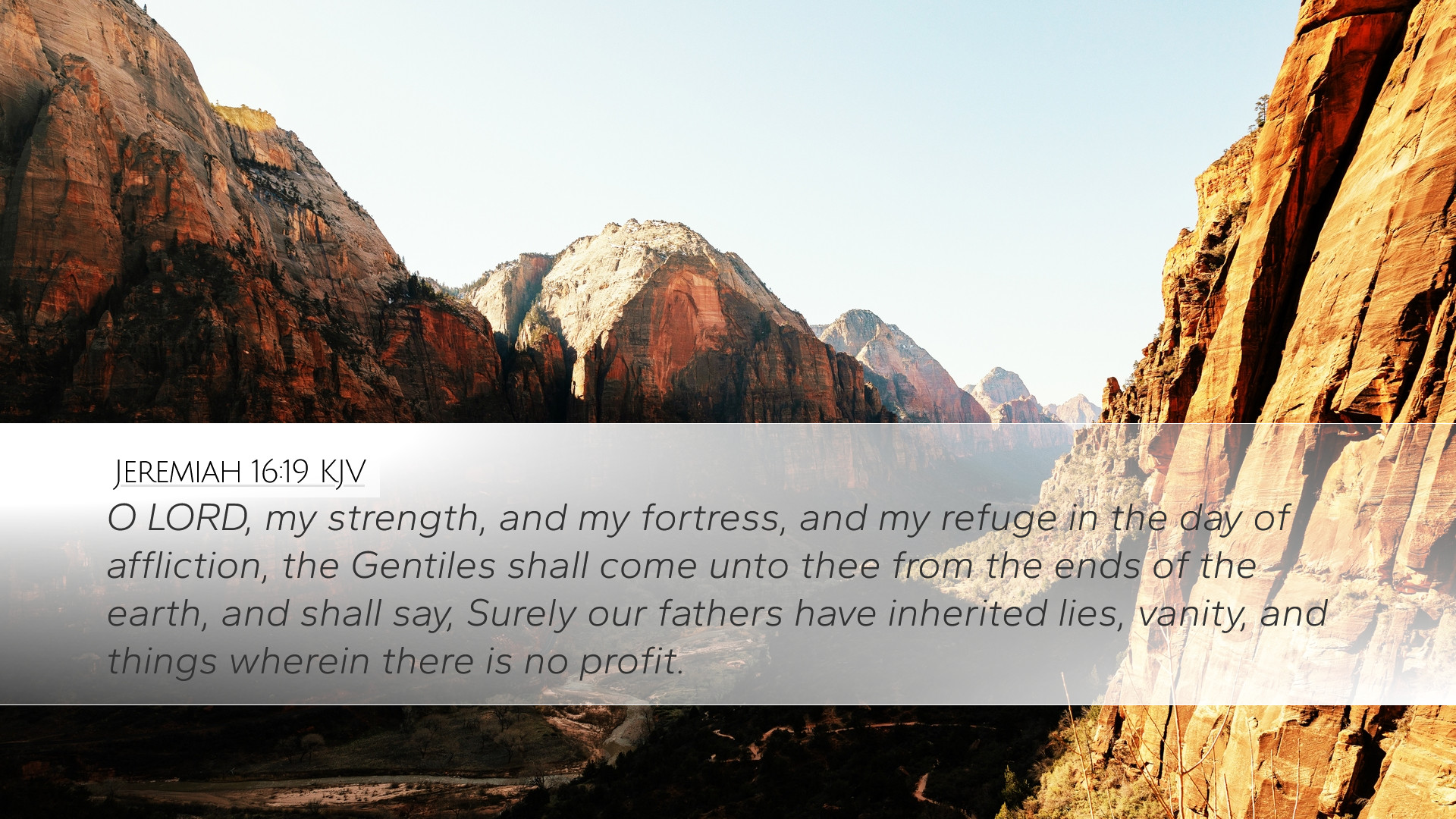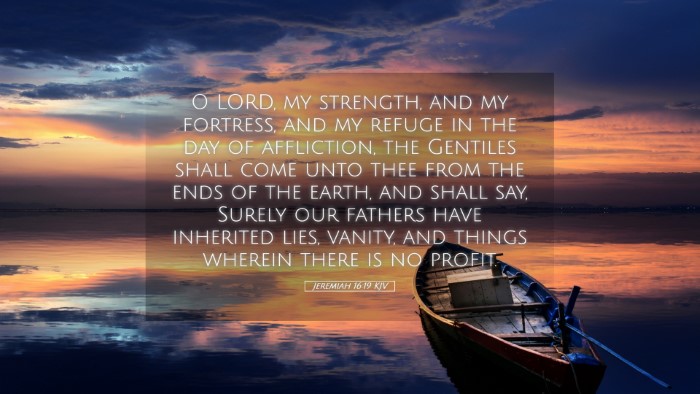Commentary on Jeremiah 16:19
Jeremiah 16:19 states: "O LORD, my strength, and my fortress, and my refuge in the day of affliction, the Gentiles shall come unto thee from the ends of the earth, and shall say, Surely our fathers have inherited lies, vanity, and things wherein there is no profit."
Overview of the Verse
This verse encapsulates a profound expression of faith amidst profound sorrow and grief. The prophet Jeremiah acknowledges God as his strength, fortress, and refuge, especially during times of trouble. As he reflects on the plight of Israel, Jeremiah also prophesies a time when the Gentiles will recognize their own futility in worshiping false gods and turn towards the true God.
Theological Significance
- The Nature of God as Refuge: The concept of God as a refuge and fortress emphasizes His role as a protector during tribulation. Not just an abstract entity, God is a personal strength for Jeremiah and, by extension, for all who seek Him in times of distress.
- Universal Acknowledgment of God: The prediction that Gentiles will turn to God indicates a broader plan of salvation that includes all nations. This foreshadows the eventual unfolding of the Gospel to the Gentiles, reinforcing God’s desire for inclusivity in worship.
- Rejection of Idolatry: The mention of "lies" and "vanity" highlights the futility of idolatry. This challenges the people of God to reflect on their faith and the true nature of divinity versus the emptiness of false worship.
Insights from Public Domain Commentaries
Matthew Henry's Commentary
According to Matthew Henry, this verse demonstrates the intimate relationship Jeremiah has with God, as he recognizes the Lord as his source of strength. Jeremiah, in reflection of his nation’s sins, publicly acknowledges the deliverance that will eventually come not just to Israel but to the Gentiles as well. Henry points out the dual focus of this passage: personal lamentation and prophetic hope. Henry emphasizes that even when Jerusalem was in desolation, the Lord was still worthy of trust.
Albert Barnes' Notes on the Bible
Albert Barnes elaborates on the idea that the verse marks a significant theological transition. The apostasy of Israel contrasts sharply with the rise of faith among the Gentiles. He explains that the longing of the Gentiles is essential in understanding the universal applicability of God's grace. Barnes suggests that this recognition from the Gentiles represents both a judgment on Israel's infidelity and an invitation extended to all to return to the true path of faith.
Adam Clarke's Commentary
Adam Clarke provides a historical and cultural context, explaining that the mention of 'the ends of the earth' symbolizes a global acknowledgment of God’s sovereignty. Clarke notes that this prophetic utterance acts as an indictment against Israel's inheritance of lies and misleadings passed down through generations. He stresses the importance of confronting the past idols and traditions as the occasion for renewal and spiritual awakening. Clarke insists that falsehood never satisfies the soul, and the acknowledgment of this universal truth is a precursor to genuine repentance.
Application for Pastors and Theologians
Pastors and theologians are encouraged by this verse to draw upon the richness of Jeremiah's lament as a model for addressing the congregation’s spiritual struggles. It offers a framework for preaching about God's protective nature along with the implications of idolatry in contemporary society.
As leaders, they should emphasize that acknowledging God as a refuge is vital, especially in times of affliction. In applying these teachings, ecclesiastical leaders can inspire congregations to reject empty traditions and past falsehoods, guiding them towards authentic worship of the true God.
Conclusion
Jeremiah 16:19 serves as a poignant reminder of God's enduring strength amidst human frailty. The parallel drawn between Israel's need for repentance and the Gentiles' eventual recognition of divine truth provides a wealth of material for theological reflection and pastoral application. As we engage with this text, we are called not only to seek God as our refuge but also to reach out in the spirit of evangelism to those who are yet to recognize His truth.


